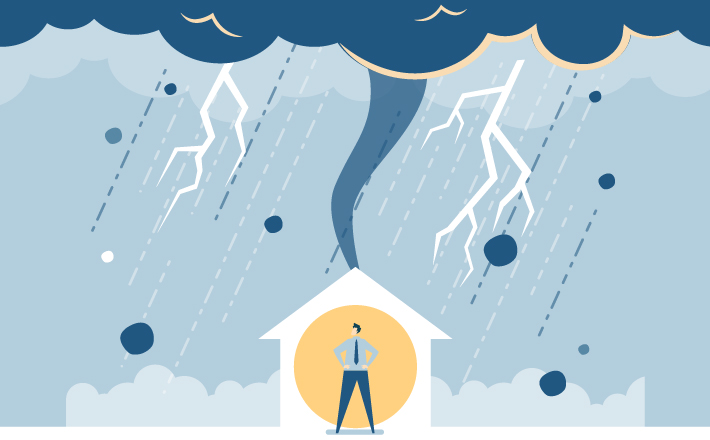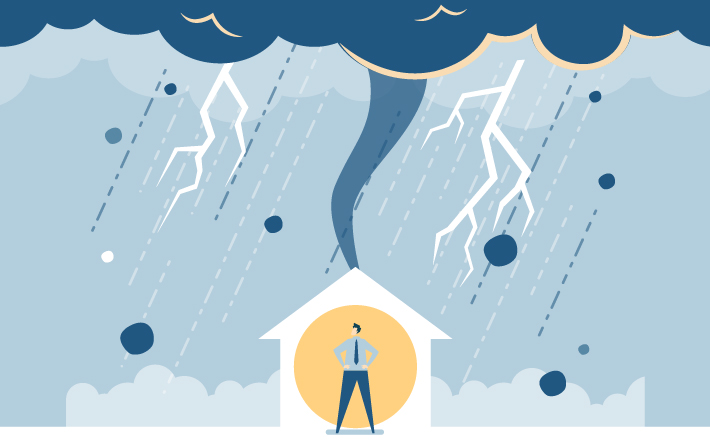How to Prepare Your Law Firm for Hurricanes and Other Natural Disasters


Again we find ourselves smack-dab in the middle of summer, which normally brings about hurricanes, fires, and other natural disasters. Short of personal harm, there is no reason why law firms and other businesses can’t keep providing services to their clients in this day and age. Cloud and internet technologies allow lawyers to access data and communicate from anywhere at any time. Also, a little disaster preparedness and business continuity planning can go a very long way in protecting yourself and your firm. Here are some tips to help prepare your law firm for hurricanes and other natural disasters:
Have a Business Continuity Plan
Some natural disasters don’t just arrive out of nowhere…you can watch hurricanes for days, getting a decent idea of whether or not one is headed your way. If it seems like a hurricane (or fire) might strike near your office, consider leaving town for a few days. In terms of evacuation, listen to your local authorities as to whether or not to leave your home and follow their advice. If you’re going to evacuate, make sure you leave enough time to get to your destination safely. The last place you want to be during a hurricane is in your car, stuck in traffic. And don’t forget to keep your gas tank filled at all times!
Also, you might want to get at least some key employees out of dodge, too. Where to go? Your best bet: The Federal Emergency Management Agency (FEMA) suggests heading at least 20 to 50 miles inland during a hurricane.
Develop an emergency plan with your staff and review it once a year. Know which employees will take care of which responsibilities and how you’ll communicate with the staff. Make sure your staff knows you are there for them and reassure them that they can work remotely if need be.
The American Bar Association Committee on Disaster Response and Preparedness has a myriad of other resources on preparing your firm for hurricanes and other disasters. Take advantage of this great resource.
Remember: Safety First
You’ll want to keep your clients’ data safe—and we’ll get to that. Of course, you’ve got to keep yourself and your employees safe, too. The American Red Cross provides tons of extremely helpful links that cover everything from setting up an evacuation plan, stocking up on supplies, protecting your home, and making sure that you have an emergency kit (including a separate one for pets) ready to go. The Department of Homeland Security and FEMA provide other useful information, too.
Don’t forget about your office! According to the National Hurricane Survival Initiative, “An often overlooked segment of hurricane safety is the workplace.” For instance, you’ll want to have your roof evaluated to ensure that it can withstand a storm. You might sandbag any areas prone to flooding. Here are some other steps to protect your physical business.
During a storm, remember to always stay away from windows or any part of the building vulnerable to falling trees. Also, make sure you know a safe room in your office—usually an interior room that doesn’t have windows.
Also, be very careful going outside after the storm. Electrical wires can fall and combined with rainwater, this combination can be deadly. Trees will be down and traffic lights will be out. Emergency crews are going to need the roads, so stay off of them as best as you can and let them do their work.
Account for Power Loss
Even if a hurricane, tornado, or other natural disaster doesn’t hit you directly, you could still lose power. Consider investing in a generator at your office and/or home or finding a friend who has one (and crashing at their place) so you can still get some work done until the power goes back on. Or course, you must keep gas generators outside, at least 20 feet away from windows and doors. Keep them away from moisture and never attempt to power the house or office wiring by plugging a generator into a wall outlet. You may also want to consider this cordless solar-powered alternative.
What about cell service? Even if your cell phone is charged, you might not be able to make calls if cell towers lack power, are overloaded, or have been damaged. One solution: You could get a landline without an answering machine. Your phone service might work if the power doesn’t, and those old-school phones just need a phone jack, not an outlet.
Even if the cell towers are functioning, if the power is out you won’t be able to use your phone indefinitely as your battery will eventually die. Here are some other great tips on making your cell service last.
Use Cloud-Based Legal Practice Management Software
One of the biggest concerns for lawyers during natural disasters is the possibility of losing all of their pertinent data. Luckily, one of the biggest benefits of using legal practice management software such as Rocket Matter is that all of your work is safe in the cloud.
When you keep all of your documents on-premise, they are always susceptible to hurricanes, other natural disasters, and theft. In other words, you could lose all your work! However, when all of your work is stored remotely in the cloud, you don’t have to worry. If the unthinkable happens and you’re using Rocket Matter, for instance, you still have access to your calendar, tasks, and every bit of information regarding every single case you’re working on.
Of course, it would be great if you chose Rocket Matter for your legal software. However, even if you go with another cloud-based option, that’s so much better than using a desktop practice management solution and keeping tons of paper files in your office that can get destroyed. Seriously! Just get in the cloud.
Back Up Your Work
One of the first attorney populations to start scanning their files were the New Orleans attorneys in the wake of Hurricane Katrina. They experienced firsthand the devastation of losing their original documents. But it’s not enough just to scan: An equally critical part is getting those digital files to a different geographic location. Here are three options:
- You can use a dedicated cloud-based document management system, such as Dropbox, Box, or OneDrive. There are also legal-specific ones such as NetDocuments, which are more sophisticated and include robust workflow and metadata support.
- Save money by leveraging a cloud-based practice management program with document storage built in. Products such as Rocket Matter have document storage built in to their legal workflows. Typically, digital files stored in these applications can be shared with clients through portals. Additionally, you should be able to leverage document automation features (such as Rocket Matter’s document assembly) that allow you to quickly produce your standard documents.
- Employ a straight-up digital backup storage device. Services like Mozy, Crashplan, or Carbonite can monitor your folder structures and continually back up your files.
Ensure Cash Flow with Online Payment Processing
Natural disasters can negatively impact your cash flow, especially if banks close, roads are blocked, or if mail delivery is interrupted. For this reason, it’s important to ensure that your firm has online payment processing in place.
If you’ve already invested in a cloud-based legal practice management solution, setting up online payment processing is a no-brainer: Your clients can pay instantly and securely via credit card or eCheck. They’ll never have to leave their house, and neither will you. What’s more, your payments will hit your bank account in about a day or two.
With online payment processing, your law firm can also set up recurring billing and payment plans that will automatically deduct from your clients’ cards or checking accounts. This set-it-and-forget-it payment method ensures your firm’s cash flow remains uninterrupted even in the event of a natural disaster.
How to Help With Disaster Relief Efforts
As a lawyer, you can help your community both before and after a natural disaster strikes. Consider the following: Businesses and individuals need legal assistance for continuity planning, securing title documents, complying with insurance, and a myriad of other reasons. And this is before anything happens.
After a natural disaster strikes, many people face numerous legal issues ranging from insurance disputes and FEMA appeals to landlord-tenant issues and consumer fraud. If you can spare your time and resources, consider joining the National Disaster Legal Aid Advocacy Center, a group that connects advocates and volunteers with communities and individuals impacted by natural disasters.
Contrary to what you believe, you should actually refrain from donating items such as clothes, shoes, toys, and canned goods. This contributes to what relief workers call “The Disaster After the Disaster.” Various shelters have specific needs, and if they receive a lot of items they don’t really need then those donations can become more burdensome than helpful. Also, donations may end up discarded if they cannot be physically delivered due to distribution channels being shut down.
Still looking to make a difference but can’t work pro bono? Here are some of your best options for helping with disaster relief efforts:
- Donate Money. While the preferred emergency response agency of the U. S. government is the American Red Cross, there are plenty of other groups that collect monetary donations after natural disasters. Just do some research first to ensure that you are donating to a reputable organization. Charity Navigator is a good place to start.
- Give Blood. After natural disasters, the need for blood donations rises exponentially due to physical injuries people suffer. Not sure where to go to donate? This site from the American Red Cross will allow you to find the nearest blood drive center based on your zip code.
- Share Your Space. If your office remains operational after a natural disaster, consider allowing less-fortunate friends and neighbors to use some of your resources, including office space, electricity, paper, and Wi-Fi.
- Volunteer Your Time. Consider volunteering for events and activities that will help disaster victims. For instance, spend time working at a shelter, clean out damaged houses, or deliver meals to first responders.
Looking to get your law firm into the cloud? Rocket Matter legal practice management can help! Schedule a free demonstration with one of our experts today to learn more!

Share post:







